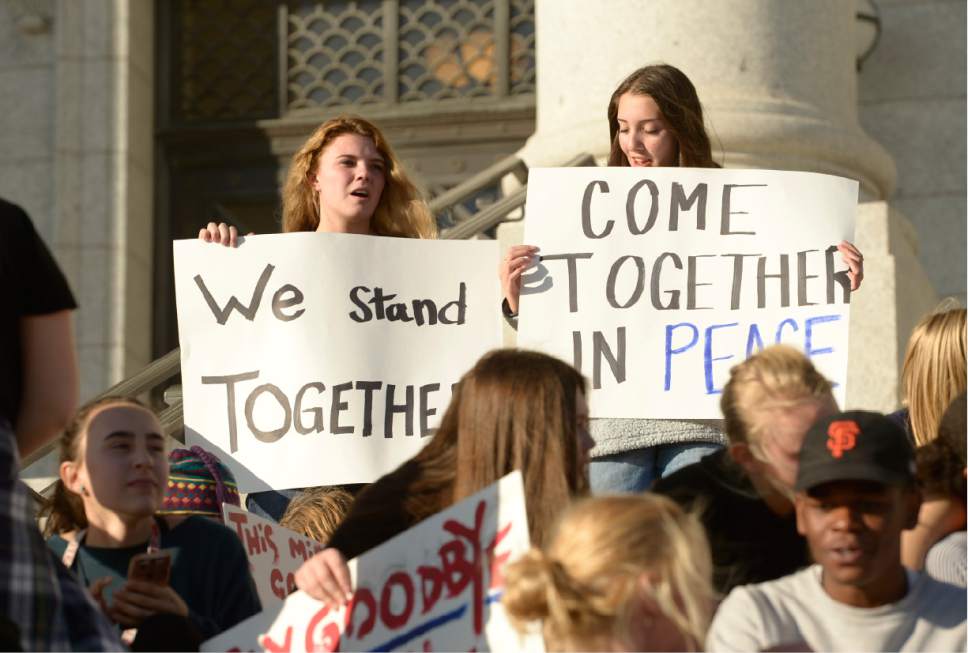This is an archived article that was published on sltrib.com in 2016, and information in the article may be outdated. It is provided only for personal research purposes and may not be reprinted.
Ask not what the new American government can do for Utah. Ask what Utah can do for the new American government.
It is natural for Utah's elected leaders and politically active citizens to consider what the new balance — or imbalance — of power will mean for our state and the issues that are important to us.
This heavily Republican state already played a disproportionately strong role in Congress, holding the chair of powerful committees and claiming the allegiance of the Senate's president pro tem. With those same Republicans holding sway over both houses of Congress and, now, the White House, the chances that Utah will have more to say over actions of the federal government are, indeed, strong.
But, as a wise man once said, with great power comes great responsibility. And there are some key opportunities for Utahns to handle that power wisely.
Rep. Jason Chaffetz, back when he was wavering on whether to support fellow Republican Donald Trump for president, assured his constituents that whether it was Trump or Democrat Hillary Clinton in the White House come January, the Government Oversight Committee he chairs would be primed to exercise its watchdog role.
Now that Trump — for whom Chaffetz finally said he would vote without endorsing — is the head of the government, it is Trump's actions that the committee should be vigorously overseeing. And Clinton's infinitely reviewed shortcomings that should pass into the hands of historians.
Surely, a politician as ambitious and media-savvy as Chaffetz knows that he builds a better future for himself, and for the nation, if he is seen as an equal opportunity busy-body.
Utah Sen. Mike Lee should have a new opportunity, and a new burden, as he pursues what is called his Article I Project. That's the drive to have Congress reclaim the decision-making powers that have slowly but constantly been flowing over to the executive branch for the past half century or more.
Lee's opportunity comes from a national government controlled by members of his own nominally conservative party. The burden is likely to come from partisan Republicans who, seeing one of their own in the White House, may suddenly decide that broad and unchecked executive powers are not such a bad thing after all.
Most important of all, especially as the shock of Trump's improbable victory sinks in among both his supporters and his opponents, will be for Utah leaders, political and cultural, to stand up for an inclusive and humane society. There is precedent for that.
The philosophy behind the Utah Compact, a compassionate approach to immigration policy from 2010, can be a welcome counterweight to anti-immigrant attitudes that have already expressed themselves through violence in the streets and taunting in our schools.
This normalization of bigoted behavior, widely labeled The Trump Effect even before the election, has no place in civil society. Utah's political and religious leaders should be leading the way in explaining that.
Utah was proud of the 2015 anti-discrimination bill that promised equal rights for gays and lesbians in housing and employment while respecting the rights of religious organizations to abide by their own principles.
Utah Gov. Gary Herbert earned widespread praise not long ago when he stood up to a tide of his fellow Republican governors in accepting the resettling of refugees displaced by the long civil war in Syria. And again Friday, when the governor joined with Utah Superintendent of Schools Sydnee Dickson to denounce harassment and bullying in the state's schools, an outbreak that can only be explained by the outcome of the election and the perception that such expressions of hate have suddenly become socially acceptable.
Utah can lead, by virtue of being on the inside of Trump's party while being on the outside of Trump's mindset.



